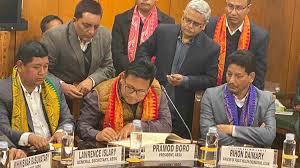GUWAHATI: – The accord signed by the Central and State governments with four factions of the National Democratic Front of Boroland (NDFB) and All Bodo Students’ Union (ABSU) was designed to bring in improvement to the Bodoland Territorial Council (BTC) and efforts were made to ensure that the interests of the non-Bodos living in that area is not affected. This is the view of the Central government.
Highly placed sources in the Ministry of Home Affairs (MHA) told a local newspaper that persuading all the factions of the National Democratic Front of Boroland (NDFB) and the All Bodo Students’ Union (ABSU) to sign the peace pact was a difficult task. It took about three year’s effort to achieve the goal.
“The MHA is keen to solve the outstanding issues as soon as possible after the signing of the accord with the Bodo groups”, sources added.
Political observers have noted that New delhi (no matter which political party was at the Centre) has always been trying to deal with the Bodo political problem with a favourable attitude. The then Union Minister of State for Home Rajesh Pilot was present when the first accord was signed between the Assam Government and ABSU in 1993. The then Deputy Prime Minister LK Advani played a key role in the signing of the Accord with the BLT and he was present during the signing of the pact, while Union Home Minister Amit Shah was present during the signing of the pact yesterday.
Sources admitted that a peaceful atmosphere in the BTAD (now BTR) is vital for the development of the region. Any disturbance in the area, including bandhs, disrupt movement of essential commodities to the entire region and that is why the MHA is keen that peace is maintained in that area and the highways and railway lines are always open.

There have been instances in the past when splinter groups broke away from the NDFB to form new outfits and to prevent such a possibility, the Centre has asked the State government to carefully watch the situation and crush any such effort with strong hands.
On the withdrawal of cases against members of the NDFB factions, sources said that the government can only withdraw the cases of the crimes which are not heinous in nature. But in cases relating to heinous crimes, the law will take its own course.
Sources admitted that all the militant groups have a tendency to give lists of cadres with highly inflated figures and that is why a screening committee, headed by the Inspector General of Assam Police (Special Branch), will review the lists carefully before the process of rehabilitation of cadres start.
Meanwhile in Bongaigaon
BONGAIGAON – All Bodo Students’ Union (ABSU) president – one of the signatories of the latest Bodo Accord – called upon the non-Bodo communities living in Bodoland Territorial Region (BTR) not to panic on the rumours that the Accord will snatch away all their rights.
Addressing a huge gathering of over 1 lakh people at Chirang district headquarters Kajalgaon today at a welcome ceremony, Boro said that this accord will cause no harm to any non-Bodo community.
The ABSU organised the ceremony to felicitate and welcome the signatories of the Accord.
Boro said that a whole community cannot be a militant group but some media had often termed NDFB or BLT as “Bodo militants” which is unacceptable. He also urged the media to not to use the words “Bodo militant”.
Signatories of the Accord Urkhaw Gwra Brahma and NDFB(P) leader Gobinda Basumatary also appealed to the non-Bodo communities not to believe in the rumours about the Accord.
ABSU leaders Jayanta Basumatary, Khanindra Basumatary and Lawrence Islary conducted the ceremony.
MCLA Rwngwra Narzary, Nirmal Brahma, UPPL leaders and representatives of different non-Bodo communities were also present in the ceremony.

